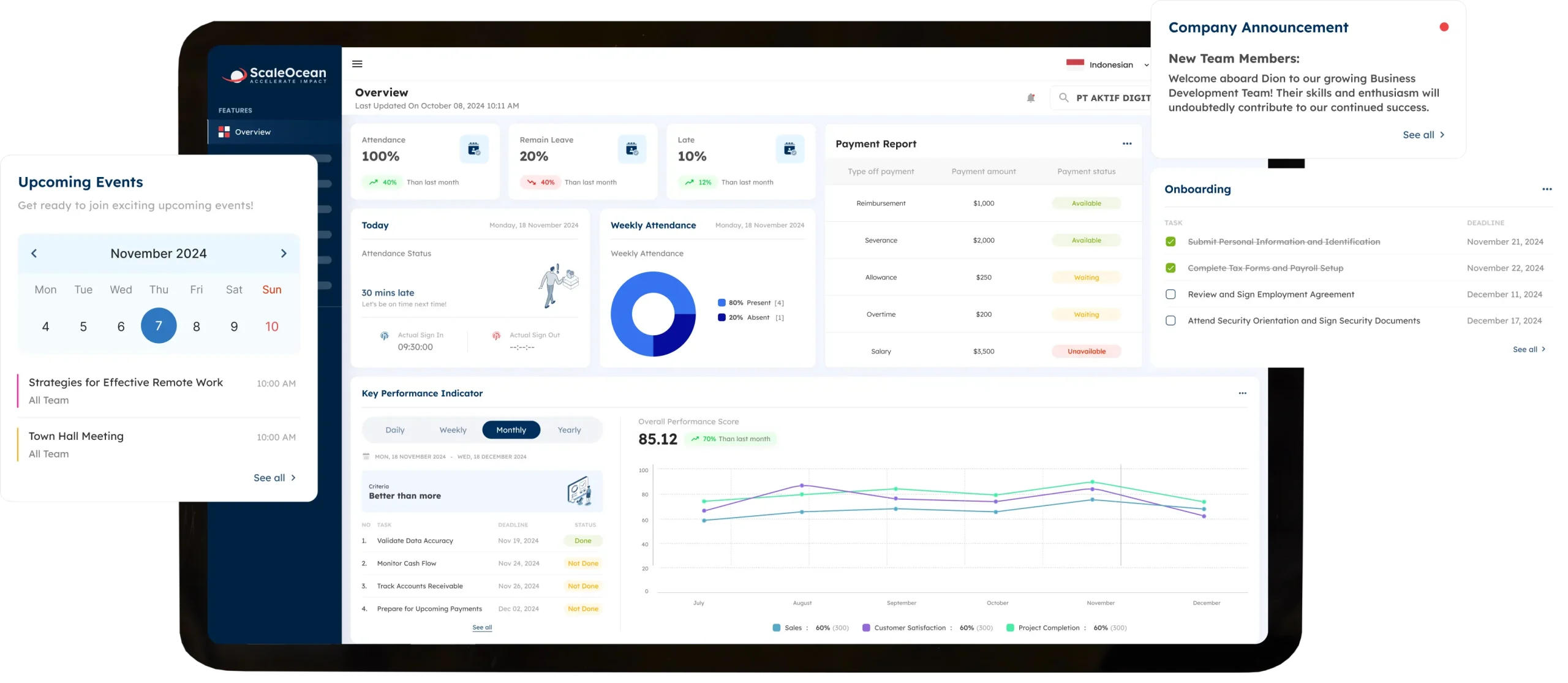As businesses traverse a rapidly changing landscape, staying ahead of HR trends is critical for attracting top talent and increasing operational efficiency. These developments influence how firms manage their workforce, ensuring that company goals are aligned with employees’ increasing requirements.
According to MOM, HR capabilities are being developed to support sector and enterprise transformation, to achieve an 80% improvement in HCDT ratings by 2025. This reflects the increased requirement for firms to respond to HR trends that improve personnel management and efficiency.
This article delves into the most essential HR trends in Singapore organizations should be aware of. It discusses the significance of understanding HR trends and takes a detailed look at 18 latest HR trends impacting the future of HR. Business executives should pay close attention to these changes to stay competitive.
- HR trends help businesses manage personnel, improve operations, and adapt to worker needs, ensuring long-term competitiveness and success.
- Explore the 18 HR trends to watch for in Singapore, which include implementing DEI initiatives, AI Technology and Automation, Predicting Data Analytics in HR Operations, and much more
- ScaleOcean HRMS integrates payroll, work pass management, and talent tracking to help businesses align with evolving HR trends and make real-time decisions.

What are HR Trends and Their Importance?
HR trends influence how businesses manage personnel, improve operations, and maintain growth. By embracing these trends, HR departments can respond to changes in worker needs, ensuring competitiveness and long-term success.
Today, human resources goes beyond recruitment and compliance. It focuses on shaping company culture, improving employee performance, and aligning workforce strategies with overall business goals to drive growth and satisfaction through HRP (Human Resource Planning).
18 HR Trends to Watch For in Singapore
As Singapore’s business landscape changes, staying current on HR trends is critical for attracting top talent and increasing efficiency. These developments influence HR strategy and link worker demands with company objectives, making it essential to address current HR trends and challenges. Here are the 18 HR trends to watch for in Singapore:
1. Implementing DEI Initiative
Diversity, equity, and inclusion (DEI) initiatives foster a balanced, inclusive workplace where employees feel valued. According to My Careers Future, a survey by the Singapore National Employers Federation and Kincentric found that 71% of employers recognize DEI’s positive impact on company culture.
Companies in Singapore are increasingly focusing on DEI programs, with policies aimed at creating inclusive environments. By addressing biases and promoting equity, these initiatives drive employee engagement and boost overall productivity.
2. AI Technology and Automation
AI and automation are transforming HR processes by reducing manual work and improving accuracy. HRMS systems, powered by AI, are taking over routine HR tasks like recruiting, employee data management, and payroll, allowing HR professionals to focus on strategic initiatives and workforce planning.
The application of AI technology in the workplace also enhances predictive analytics, helping HR departments forecast trends, make data-driven decisions, and provide personalized employee experiences. HR adoption of AI accelerates recruitment and decision-making, leading to smarter hiring and retention strategies.
3. Predicting Data Analytics in HR Operations
Data analytics is becoming an essential part of HR operations. By analyzing workforce data, HR departments can better understand employee behavior, measure performance, and predict future needs, enhancing overall efficiency and employee satisfaction. These are key HR trends to watch for in the coming years.
Predictive analytics can also be used for talent management. By identifying trends in employee turnover, engagement, and productivity, HR can proactively address issues and plan for future workforce requirements, staying ahead of HR analytics trends.
4. The Foreign Talent Policy
Singapore’s foreign talent policy attracts top global professionals, boosting business growth. Companies that welcome qualified persons can boost creativity and competitiveness, benefit from varied viewpoints, and ease the handling of work permits such as EP, S Pass, and Work Permit.
Furthermore, the policy assists enterprises in obtaining the expertise required for new industries while maintaining the local workforce quota, known as the dependency ratio ceiling, in line with HR compliance. It strengthens Singapore’s status as a global hub for innovation and talent.
5. Flexible Work Models
Flexible work models, such as remote and hybrid work, are becoming increasingly popular in Singapore. This flexibility enables individuals to balance work and personal responsibilities, hence enhancing job satisfaction and productivity, making it one of the key HR trends to watch for.
Employers that embrace flexible work methods can recruit top talent who value work-life balance. Adopting these approaches is critical to being competitive and satisfying the changing expectations of the modern workforce.
6. Pay Transparency and Equity
Pay transparency promotes fairness and accountability in compensation practices. It ensures that employees are aware of how their pay compares to others in similar roles, which helps reduce wage gaps and builds trust within the organization.
In Singapore, many companies are adopting pay transparency to align with global best practices. This commitment to equity not only attracts talent but also fosters a positive organizational culture, which is also supported by the favorable corporate tax in Singapore.
7. Communicate Offerings Effectively
Effective communication is key to the success of HR initiatives. Clear, consistent communication ensures that employees understand company policies, benefits, and opportunities, reducing confusion and improving overall engagement.
HR teams that communicate effectively can build stronger relationships with employees, resulting in higher morale and loyalty. This communication should be tailored to individual preferences, ensuring that all employees are well-informed.
8. Employee and Career Development
Investing in employee development is essential for growth and retention. Offering career development opportunities, such as training and mentorship, helps employees enhance their skills and achieve their career goals, making it one of the top HR trends to watch for.
By fostering continuous learning, companies can improve human resource management process with a culture of development, where employees feel empowered to improve their capabilities. This not only benefits employees but also enhances the organization’s talent pool.
9. Be Ready for the New Workforce
The new workforce is technologically adept and prioritizes flexibility and work-life balance. Employers must adapt by providing digital tools, flexible schedules, and professional development opportunities. Strategic personnel planning enables businesses to match these preferences and recruit top talent.
Understanding these needs enables firms to develop a culture of creativity and job happiness. By aligning with HR trends to watch for, businesses can foster long-term success and meet the expectations of their new staff.
10. Mental Health and Benefits
Mental health is a major priority in HR because businesses know the influence it has on productivity. Offering mental health benefits, like counseling and stress management programs, promotes employee well-being. This technique leads to fewer and less severe health insurance claims, as well as lower absenteeism.
Companies that address mental health foster a healthy workplace culture in which employees feel supported. This reduces absenteeism, increases engagement, and improves overall performance, resulting in a healthier and more productive staff.
11. Employee Self-Service
Employee self-service systems allow employees to manage their own HR activities, such as updating personal information, requesting leave, and accessing pay stubs. This decreases the administrative burden on HR while increasing employee happiness.
Companies can enhance productivity and eliminate errors by giving employees control over HR-related duties. This method also enables HR teams to focus on more strategic objectives, making it one of the important HR trends to watch for in the evolving workplace.
12. Skills-Based Hiring
talents-based recruiting assesses candidates based on their talents rather than their experience or education. This technique assists firms in identifying the most qualified applicants for certain roles, resulting in improved performance and retention.
Skills-based hiring is gaining traction in Singapore as businesses look for talent who can adapt to rapidly changing industries. This strategy enables employers to hire more varied and capable personnel.
13. Strategic HR Business Partnering
Strategic HR business partnership entails HR working closely with business leaders to integrate human capital initiatives with corporate objectives. This collaboration improves decision-making and ensures that HR procedures support the overall corporate goals.
Businesses that integrate HR into strategic decision-making can ensure that their workforce is aligned with the company’s goals. A human resources strategy example can help illustrate how this method leads to more effective labor planning and organizational performance.
14. Sustainability and Adaptability
Sustainability is becoming more important in HR as companies strive to create ecologically responsible workplaces. HR plays an important role in pushing sustainability activities, such as promoting eco-friendly practices and supporting green certifications.
Being adaptive is critical in today’s fast-changing corporate world. HR must assist firms in fast pivoting by implementing new technology, policies, and procedures that are consistent with sustainability objectives, while staying aligned with HR technology trends.
15. Leader and Manager Development
Leadership development is critical for forming effective teams and achieving commercial success. Investing in leadership training programs helps managers develop the skills required to effectively lead and assist their teams.
Companies in Singapore are prioritizing leadership development to build a pipeline of future leaders. As one of the key HR trends to watch for, businesses that invest in their management can secure long-term success and growth.
16. Total Rewards
Total incentives include all types of compensation, such as salary, benefits, and non-monetary awards. A well-structured, comprehensive rewards program attracts and retains top talent by providing competitive salaries and desirable benefits.
To be competitive, Singapore companies are rethinking their whole rewards strategy. As one of the HR trends to watch for, businesses can boost employee retention by providing comprehensive rewards packages that cater to their various demands.
17. Upskilling
Upskilling is critical for individuals to stay relevant in a quickly changing employment environment. Companies that invest in upskilling programs help employees learn new skills and adapt to industry developments, resulting in a future-ready workforce.
Singapore’s HR departments are increasingly focusing on upskilling initiatives to better equip their personnel for new challenges. This not only benefits employees but also improves the organization’s competitiveness.
18. Work-Life Balance
Work-life balance remains a high issue for employees, particularly in the aftermath of the pandemic. Companies that provide flexible work arrangements and encourage a healthy balance between personal and professional lives tend to have higher employee satisfaction and retention.
In Singapore, businesses are realizing the value of work-life balance in attracting and maintaining talent. Companies can promote employee well-being by providing flexible scheduling and wellness initiatives.
Flexible ScaleOcean HRMS Implementation for Future HR Trends
ScaleOcean provides comprehensive human resource software in Singapore, such as core HR modules, payroll, and regulatory administration. It also offers real-time work pass management, foreign worker quota tracking by industry, and talent management, all on one unified platform.
The system is scalable, allowing businesses to expand and customize their human resource functions as they grow. ScaleOcean’s HRMS integrates with the CTC grant, allowing firms to optimize HR practices while obtaining government assistance to keep up with evolving HR trends. Here are the key features of ScaleOcean software:
- No Hidden Costs: ScaleOcean ensures transparent pricing with no hidden fees, making it easy to budget for your HRMS.
- Flexible and Scalable System: ScaleOcean’s HRMS adapts to any business size, offering flexibility and scalability as your business grows.
- AI-Powered Analytics and Predictive Business Needs: AI insights in ScaleOcean help HR teams predict trends and make proactive, data-driven workforce decisions.
- Unlimited Users at No Additional Cost: ScaleOcean allows unlimited users without extra fees, supporting seamless growth without rising costs.
- Fast ROI: ScaleOcean provides a quick ROI by automating HR tasks, reducing manual work, and improving overall efficiency.
Conclusion
Staying ahead of HR trends is critical for companies looking to remain competitive and recruit top personnel. Adapting to these trends allows firms to boost productivity, increase employee engagement, and ensure long-term success by addressing the changing workforce demands.
ScaleOcean offers HRMS and AI-powered analytics to improve HR procedures and increase employee satisfaction. As a vendor, ScaleOcean provides organizations with tools to connect their plans with future HR trends. As a result, ScaleOcean offers a free demo so that customers may see the benefits for themselves.
FAQ:
1. Is HR in demand in Singapore?
Human Resources is increasingly sought after in Singapore as businesses prioritize effective workforce management and employee retention. With the growing integration of AI in the workplace, HR professionals skilled in technology and people management are in high demand across various sectors.
2. What are the current trends in HRM?
HRM trends today are shaped by AI-powered recruitment and management tools, remote work arrangements, employee wellness initiatives, data-driven insights for decision-making, and a strong emphasis on diversity, equity, and inclusion (DEI) to improve organizational culture.
3. What is the biggest challenge facing HR today?
HR faces the challenge of navigating digital transformation while maintaining employee engagement. With the rise of automation and remote work, HR must balance these technologies with maintaining personal connections and addressing talent shortages in critical roles across industries.
4. What are the HR trends for 2026?
In 2026, HR will be reshaped by tech and people‑focused strategies. AI will automate hiring, while continuous learning becomes a priority. Firms will also boost employee engagement using data insights and flexible work models.












 PTE LTD..png)
.png)

.png)








.png)
.png)
















